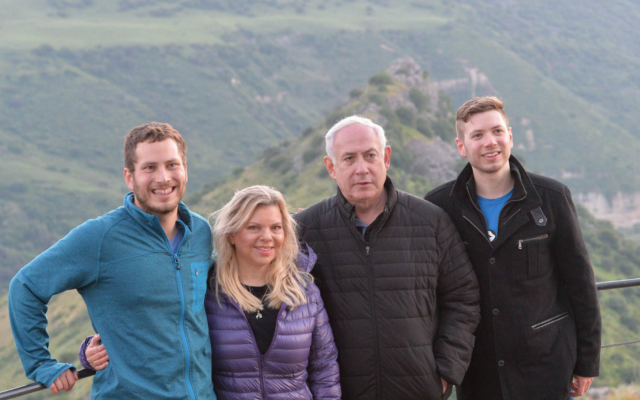In the midst of the genocide that many Jewish scholars and organizations accuse Israel of committing, soldiers hold a Seder and attach mezuzahs to the homes of those they have killed by the 10s of thousands:
This article in Haaretz reports Graffiti in Gaza that reads: “Without settlement, there is no victory”, and shows a video clip of a soldier at the Seder in a captured Gaza hospital proclaiming the “revival of the state of Israel”.
In another clip, David Amitai, rabbi of a yeshiva in a settler outpost in the West Bank, whilst standing in an army base set up in a captured Palestinian hospital, reads from the Tanya, a book by Rabbi Shneur Zalman of Lubavitch; “The Land of Israel is acquired through suffering… if we are not reconciled to the suffering and continue to complain we will not inherit the land” –
Yet another video shows Israeli soldiers attaching the mezuzahs to doorways of bombed-out buildings in Gaza.
In summary the article notes that “the depth of support within the army for settling Gaza is hard to gauge, but it is clear that this is a phenomenon that can be seen on the ground. After years of strengthening religiosity in the army, the results are palpable, as are the influences of religious Zionism on the reserve forces.”
Zionism represents a form of supremacism and extreme nationalism that many Jews have been condemning for 128 years, ever since its inception. Zionism hasn’t changed in all that time, except to become more violent. No matter what the International Holocaust Remembrance Alliance (IHRA) would wish the world to believe about Zionism and Israel, the slaughter in Gaza, and calls by a multitude of messianic politicians to “transfer” Palestinians and settle their land, speak for themselves. Israel is a rogue state with an immoral army, which is why it is facing charges of genocide and crimes against humanity at the ICJ and ICC. Unless we believe that these organisations are simply antisemitic, which is what wide scale adoption of the IHRA’s guideline definitions on antisemitism open the door to. Something the IHRA is vigorously working towards, with 43 governments worldwide already adopting the definitions, including 32 European countries. Thirty five US states have adopted it as part of their legislature and the US government is poised to pass into federal law.
Despite this and the current carnage and tragedy, there is hope, and a force for good at work. Whilst Israel ethnically cleanses Palestinians in Gaza and its soldiers hold a Seder in readiness for Jewish settlement, and also violently persecutes Palestinians in the West Bank in readiness for ethnic cleansing and annexation, Naomi Klein held a “Seder in the Streets to Stop Arming Israel.”
As Klein points out to fellow Jews, “we need an exodus from Zionism” calling on Jews to “oppose the false idol of Zionism.” Her words are echoed by Jewish Voice for Peace (JVP), Not In My Name, and countless other, growing Jewish anti-Zionist movements that condemn Zionism and criticise Israel in ways that fully qualify as antisemitic under the current IHRA guidelines.
Palestinians understand that Jews are not enemies but allies, and that they stand against the same oppression, racism, and supremacy that endangers us all. As the JVP often says, “none of us will be free until all of us are free.” It is also clear to Jews that at one time we inhabited the land together peacefully, and shall again, only without the supremacism, apartheid and ethno-violence of Zionism.
We can be confident of this because Zionism emerged too late in history to pull off the great magic trick of making the Palestinians disappear. The ethnic cleansing and genocide might have succeeded had it been carried out in the 19th Century, without the eyes of the world watching. Now the world watches and knows. Even were Zionists to succeed in ethnically cleansing all Palestinians, Israel’s policies are unsustainable in the long run. No matter if the global balance of power momentarily shifts towards the right and fascism in Europe and America, it will come to an end sooner rather than later, and the world must then advance, even incrementally, towards being more ethical, enlightened, and just. As it always has done, or else destroy itself.
The alternative to truth and justice – the establishment of lies and hegemonic violence as an enduring global order – is impossible because it is unsustainable. This is why the Holocaust is rightly held to be the abomination that it is: because the world is more ethical than it was when the crime was committed. Had the world not advanced morally and ethically, the Holocaust would not possess the status it does, no matter the degree of cynical manipulation of guilt and exploitation of the Holocaust by Zionists, as scholars such as Norman Finkelstein and Noam Chomsky have shown to be the case. There would be little guilt to manipulate, had the world become less rather than more ethical.
The Holocaust is recognized as one of the worst crimes against humanity precisely because the world possesses a conscience, and this conscience functions irrespective of whether it is manipulated or not. Indeed, the manipulation is only effective because there is a global conscience, which in a world that becomes less rather than more ethical, would eventually be extinguished.
Therefore, for Israel to ensure a sustainable and just future, it must align its policies with international norms and ethical standards, and face accountability. This includes recognizing the rights and humanity of Palestinians and working towards a peaceful and just resolution that benefits all people in the region. Whether it be one state or two, this cannot ignore the rightful return of Palestinians within the boundaries of all Mandate Palestine.
The IHRA’s Role in Shielding Israel and Perpetuating Zionism
The IHRA’s guidelines, which conflate criticism of Israel with antisemitism, stifle necessary and legitimate debate on these crucial issues. By labelling valid criticism as antisemitic, the IHRA protects policies that many see as unjust and unethical. Attempting to stifle expression of views critical of Israel will only succeed in adding one more criticism: that the IHRA is an agent of Israel. The pursuit of peace and justice requires a willingness to confront uncomfortable truths and to hold all parties accountable for their actions. Engaging with the criticism, even and especially when it is unfounded, is constructive and protective of Jews, whilst attempting to preemptively suppress it is dangerous. Weaponised antisemitic labelling, which the IHRA guidelines will encourage, now represents an additional threat to Jews, inviting the accusation and trope of attempting to control and manipulate the narrative.
If it truly is concerned with the protection of Jews, the IHRA is better advised to recognise what Naomi Klein and other Jews are voicing: Zionism is the enemy.
The world is watching, and history will judge.

